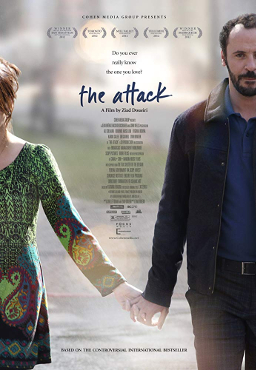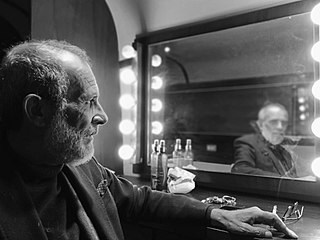Related Research Articles

Lila Says is a 2004 French film directed by Ziad Doueiri. The plot is based on the novel of the same title written by "Chimo".

The Damour massacre took place on 20 January 1976, during the 1975–1990 Lebanese Civil War. Damour, a Maronite Christian town on the main highway south of Beirut, was attacked by left-wing militants of the Palestine Liberation Organisation and as-Sa'iqa. Many of its people were killed in battle or in the massacre that followed, and others were forced to flee. According to Robert Fisk, the town was the first to be subject to ethnic cleansing in the Lebanese Civil War. The massacre was retaliation for the Karantina massacre by the Phalangists.

West Beirut is a 1998 Lebanese war comedy-drama film about the Lebanese Civil War, written and directed by Ziad Doueiri. The film was selected as the Lebanese entry for the Best Foreign Language Film at the 71st Academy Awards, but was not accepted as a nominee.

Ziad Rahbani is a Lebanese composer, pianist, playwright, and political commentator. He is the son of Fairouz, one of Lebanon and the Arab world's most famous singers, and Assi Rahbani, one of the founders of modern Arabic music.

The cinema of Lebanon, according to film critic and historian Roy Armes, is the only other cinema in the Arabic-speaking region, beside Egypt's, that could amount to a national cinema. Cinema in Lebanon has been in existence since the 1920s, and the country has produced more than 500 films.
Mohamad Chamas is a Lebanese actor. In 1998 he was living in an orphanage, and had no acting experience, when director Ziad Doueiri cast him in a leading role in the critically acclaimed film West Beirut. He has been described as having "the explosiveness of James Cagney".
Randa Chahal Sabag or Sabbagh was a Lebanese film director, producer and screenwriter. Born in Lebanon to an Iraqi mother and a Lebanese father, she died of cancer in Paris at the age of 54.

Carmen Lebbos is a Lebanese theater, television, and film actress who has worked in film, television actress. Lebbos has been active since 1981; she has been in several television series and movies including Ziad Doueiri’s West Beirut and Josef Fares’s Zozo.
Ziyad is an Arabic given name and surname.

Ahmad Kaabour is a Lebanese singer, songwriter, music composer and actor. He is perhaps best known for his song "Ounadikom" which he composed in 1975 upon the outbreak of the Lebanese civil war.

Ziad Takieddine is a Lebanese-French businessman, described by The Telegraph as an "arms broker".

Emad Burnat is a Palestinian farmer and filmmaker, known for the documentary 5 Broken Cameras (2011). He is the first Palestinian nominated for the Academy Award for Best Documentary Feature.

The Attack is a 2012 French/Belgian/Qatari/Egyptian drama film directed by Ziad Doueiri, who is also one of the script writers.

The Insult is a 2017 Lebanese legal drama film directed by Ziad Doueiri and co-written by Doueiri and Joelle Touma. It was screened in the main competition section of the 74th Venice International Film Festival. At Venice, Kamel El Basha won the Volpi Cup for Best Actor. It was selected as the Lebanese entry for the Best Foreign Language Film and was nominated for the Oscar at the 90th Academy Awards.

Kamel El Basha or Kamel el-Basha is a Palestinian actor, theatre director, teacher, and translator.

Ziyad al-Nakhalah is a Palestinian politician who is the leader of the Palestinian Islamic Jihad (PIJ).

Antoun Sehnaoui is a Lebanese banker and film producer, He is the chairman of the board of the SGBL Group, comprising the Société Générale de Banque au Liban (SGBL), the Société Générale de Banque in Jordan (SGBJ) and financial company Fidus Wealth Management. He is also the chairman of the board of the Compagnie Financière Richelieu, a European banking group comprising Banque Richelieu France, Banque Richelieu Monaco and Richelieu Gestion. He is also a member of the board of the Lebanese Banking Association, and a member of the Academy of Motion Picture Arts and Sciences.
Dr. Ziad Eva Fouad Noujeim is a Lebanese journalist and oral surgeon, who worked as lead anchor at TV stations such as MTV, LBC, OTV, Al Hurra and MashreqTV. He hosted the political show Istifta (استفتاء) which resulted in the closure of the on MTV channel, then he moved to Alhurra TV, where he broadcast the program sa'aa horra.
Diamand Abou Abooud is a Lebanese actress, working in Europe and the Arab world, specifically Lebanon and Egypt.
References
- ↑ زياد دويري وفيلمه المثير للجدل «الهجوم»: قدمت وجهة نظر الاسرائيلي دعما لشرعية الموقف الفلسطيني
- ↑ Interview avec Ziad Doueiri (in French)
- ↑ Saunders, Mark; Chen, Michael (March 2, 2018). "San Diego State graduate's Oscars nomination almost derailed by controversy". ABC10 News. Retrieved 18 February 2021.
- ↑ "Ziad Doueiri's latest controversial film, 'The Insult,' is on Oscar's shortlist". Los Angeles Times. 2018-01-11. Retrieved 2021-02-15.
- 1 2 "Ziad Doueiri". Internet Movie Database . Retrieved 21 June 2012.
- ↑ Lebanese Film Director Ziad Doueiri Defends Visit to Israel: Boycott Harms us, Not Israel, MEMRITV, Clip No. 3862, May 24, 2013.
- ↑ Deadline Hollywood: ‘The Insult’s Ziad Doueiri Freed By Lebanon Court After Post-Venice Detention
- ↑ Tartaglione, Nancy (11 September 2017). "'The Insult' Director Ziad Doueiri Detained In Lebanon After Venice Win". Deadline. Retrieved 11 September 2017.
- ↑ "Lebanese Director Ziad Doueiri Detained in Beirut, Cleared of Charges by Military Tribunal". Variety. 11 September 2017. Retrieved 11 September 2017.
- ↑ "This Lebanese filmmaker is getting global acclaim, but back home he got arrested". The World from PRX. Retrieved 2021-02-15.
- ↑ "Tessalit involved in 'Affaire'". Variety. May 19, 2012. Retrieved 21 June 2012.